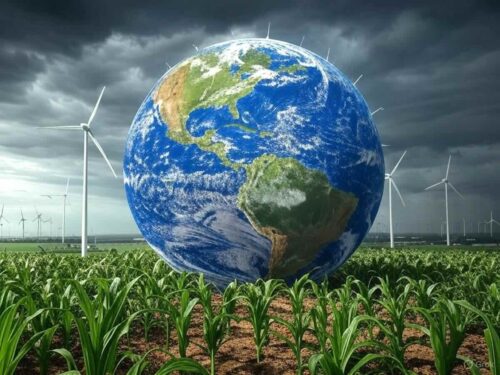by L. Lueken, May 21, 2025 in WUWT
AfricaNews (AN), in collaboration with the Associated Press, recently posted an article claiming that recent drought in Nigeria is due to climate change. This is unlikely to be the full story. Although data is sparse for the region, human activities are just as likely to be contributing to desertification as cycles of drought are.
The article, “Nigerian farmers struggle as climate change dries up water sources,” claims that climate change is the cause of recent drought in Nigeria, leading to crop declines. Surface water is becoming scarce during the dry seasons, so some farmers are forced to dig wells to irrigate their crops. AN writes that “[r]iverbeds have started to run dry,” and so the blame “is pointed firmly at climate change, with conservationists warning that food could become scarce if measures are not urgently put in place to help the farmers irrigate their land.”
While it is true that Nigeria has been suffering from extended drought, particularly in the northern part of the country, it is not clear that this is all or even mostly because of any human-caused climate change due to changing temperatures. Natural drought, combined with human error in land and water management, seems to be the more likely culprit.
According to the article, over 80 percent of Nigeria’s farmers are smallholder farmers, and they make up 90 percent of the nation’s crop production. The article points at maize (corn) as a sample crop that is suffering due to the water shortage, it “saw a decline in cultivated land from 6.2 million hectares in 2021 to 5.8 million hectares in 2022.”
Crop production data from the United Nations Food and Agriculture Organization (FAO) show that Nigeria’s corn production has been increasing over time. It actually shot upwards the most in recent decades, after remaining relatively flat through the 1980s. Between just 1990 and 2023, Nigerian corn production increased 91 percent, while yields increased 71 percent. (See figure below)
…


 In contrast, as an ecologist I had to consider landscape changes, geological history, changes to hydrology, biological interactions, as well as weather and natural climate changes. And I had been observing those effects for 15 years.
In contrast, as an ecologist I had to consider landscape changes, geological history, changes to hydrology, biological interactions, as well as weather and natural climate changes. And I had been observing those effects for 15 years.